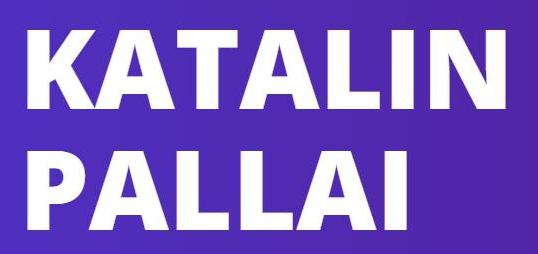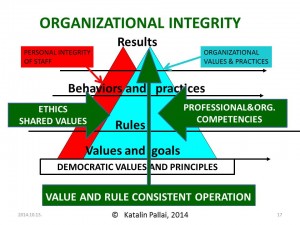 As public integrity and integrity management are relatively new terms I add a short explanation. Public integrity management became important as means for corruption prevention and strengthening public trust in government. However, its importance is wider. It is a pillar of good governance. Democratic public integrity means that the political system and public administration uses the powers and resources entrusted to them according to the democratic values and principles for the implementation of the officially accepted purposes and justified public interest. Public integrity management is a complex challenge it is about enhancing the ethos of democratic integrity and creating the institutional setting that operates according to it.
As public integrity and integrity management are relatively new terms I add a short explanation. Public integrity management became important as means for corruption prevention and strengthening public trust in government. However, its importance is wider. It is a pillar of good governance. Democratic public integrity means that the political system and public administration uses the powers and resources entrusted to them according to the democratic values and principles for the implementation of the officially accepted purposes and justified public interest. Public integrity management is a complex challenge it is about enhancing the ethos of democratic integrity and creating the institutional setting that operates according to it.
Re-design of the post-graduate education program for integrity advisors, 2014
This is a one year long post-graduate education program offered by the National University for Public Service open for experienced civil servants. The certificate it gives is the condition for fulfilling the integrity advisor position in public institutions. When I became the program director I was commissioned with the redesign of the formerly traditional academic education program to a modern competency based program. The goal of my new approach is to develop both the professional competences in the specific roles the advisors need to play in public organizations, and to foster the ethos needed for fulfilling these roles in the public domain. Nine professional competency subjects are in the focus of the curriculum, that cover the roles assigned to integrity advisors. Academic knowledge is connected to these professional competencies and offer conceptual foundation and underpinning to difficult professional decisions. Personal competency development trainings complete these subjects. Beyond the new approach and structure of subjects two methodological innovations are: the wide use of experiential methods in order to develop reflective and argumentative skills of the students, and the deliberate norm socialization process during the training that is aimed to offer models for the norm building that the advisors have to perform in their organizations during their practice.
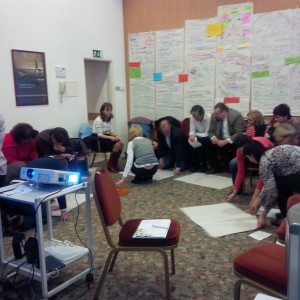 Design of Public Ethics and Integrity curricula for civil servants and public leaders, 2014
Design of Public Ethics and Integrity curricula for civil servants and public leaders, 2014
In the frame of the life-long education program for civil servants I designed a one day long Public Ethics training methodology for staff members and a 2,5 days Integrity management curriculum for public sector leaders and trained the trainers for the trainings. Due to the good reputation of the previous integrity trainings presented during the earlier mentioned EU sponsored project, a large number enrolled already in the first months. According the forecast together with the accomplishments of the earlier trainings I designed by the end of 2014 15% of the Hungarian civil service will be trained by my methodologies.
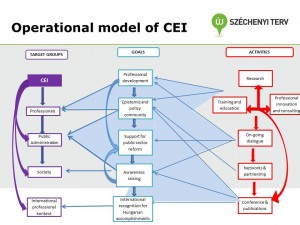 Building up the Center for Excellence in Integrity at the National University for Public Service, since 2013
Building up the Center for Excellence in Integrity at the National University for Public Service, since 2013
The Center for Excellence in Integrity (CEI) was established to secure sustainability for the results obtained during the implementation of the Corruption Prevention project mentioned below. The mission of CEI is to foster the implementation of public integrity in Hungary by gathering, generating and disseminating knowledge and innovative methods for corruption prevention and integrity management, and by taking an active part in advancing the case for public integrity. CEI’s activities include research, policy initiatives and knowledge sharing among professionals and to the wider public. CEI’s responsibility is also the development of integrity curriculum for the National University for Public Service and its quality assurance. My role has been to launch the operation of the Center, identify the role it should play, design a strategy for its sustainable functioning and lead its operation.
Integrity management education for civil servants. 2012-13
In the frame of a large EU financed project on Corruption Prevention, implemented in cooperation between the Hungarian National University of Public Service and the Ministry of Public Administration, I was commissioned to develop training curricula for civil servants. On the basis of the curricula the largest further education program of the Hungarian public administration is being implemented: more than 800 senior civil servants and 8500 civil servants (10% of the civil service) are educated on corruption prevention and on approaches to strengthen organizational integrity. I have also presented the training for a group of state secretaries, deputy state secretaries and government commissioners. The method became a European best practice. On the basis of the method I also developed a course on integrity management for MA level university education. From 2014 the course will be part of the obligatory curriculum at the National University of Public Service and introduced on other Hungarian universities as well.
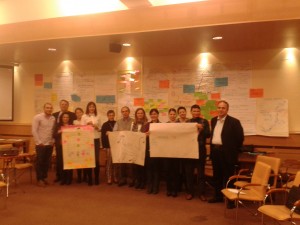 In 2013 december the methodology was presented in englsh for a group of anti corruption professionals from South East Europe and Turkey in front of a high level international peer review team and was praised as an innovative methodology even by the EU Anticorruption Report, 2014. The peer revisew reports can be viewed below through the links.
In 2013 december the methodology was presented in englsh for a group of anti corruption professionals from South East Europe and Turkey in front of a high level international peer review team and was praised as an innovative methodology even by the EU Anticorruption Report, 2014. The peer revisew reports can be viewed below through the links.
EllenGPeerReviewTraining10-12Dec13 short Vasilache peer review report
